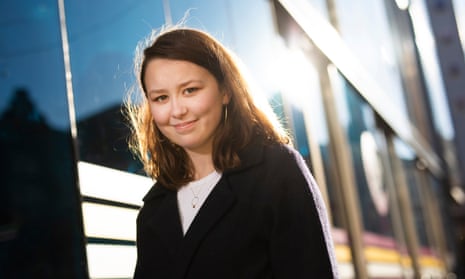Comedians like to trade stories about the bladder-squeezing agony of walking on to a stage to perform standup for the first time. For Liv Hill, the experience had extra layers of terror. First, she is not a comedian; she was acting the part in Jellyfish, a Ken Loach-ish drama from director James Gardner. Hill – who was 16 at the time – plays Sarah Taylor, a gobby, disadvantaged Margate teenager whose raw comedy talent is spotted by her drama teacher. Second, the film’s tiny budget didn’t stretch to extras, so the crew pulled in 50 people off the street to be the audience. Then, as if that wasn’t bad enough, on the morning of the shoot, Hill woke up to five new pages of script. Gardner had rewritten her monologue overnight. “We started shooting at 12 noon. I was crapping myself.”
In the end, it was all right on the night. A joke or three landed, and there were some laughs in the crowd. “But I did get a real heckler,” Hill says, giggling. “I was in character, so I didn’t feel crushed. If I had been myself, I would have rushed off stage.”
When Hill walks into the bar of a London hotel for our interview, she catches me off guard by how different she looks from her character in Jellyfish. An ordinary teenager, she is wearing black dungarees over a Pink Floyd T-shirt from Topshop and big gold hoop earrings, with no makeup. She is smart and articulate, but speaks softly, and is clearly a bit nervous.
Which is funny because on screen, Hill (now 19) has made a name for herself with powerful performances as teenage outsiders with confidence that borders on aggression. But her real gift is showing how vulnerable her characters are underneath. In Jellyfish, Sarah is disruptive and antisocial at school, while in Margate she is considered a bit promiscuous. The truth is that Sarah is one of the thousands of young carers in Britain, looking after her mentally ill mum and two younger siblings. After school, she works in a tatty amusement arcade and gives handjobs to seedy customers for extra cash.
What’s so great about Jellyfish is that this is, in fact, an origin story parading as miserablism. The standup routine at the school talent show – where Sarah mines her life for material – is a real mic drop of a movie climax. Like a cross between Tracey Emin and Frankie Boyle, Sarah lashes out at the audience with insults, then proceeds to shame them with soul-baring confessional anecdotes about family life.

The swiftest way to turn Hill a shade of beetroot is to mention the ecstatic reviews she has been getting for Jellyfish. Has recognition improved her confidence as an actor? Hill shoots me an “as if” look. “It’s weird because I don’t believe it. Watching Jellyfish now, I’d want to do so much differently. So, when I come to something like this,” she nods around the restaurant, “I get impostor syndrome. I feel a bit of a fraud.” She is in town to attend the Critics’ Circle awards, where she is nominated for young performer of the year.
Hill says she is drawn to characters who are completely different from her. She grew up in an army family, and had a peripatetic childhood, living in Germany, Cardiff and Nottingham before settling in Derbyshire. At 15, she joined the Nottingham’s Talent 1st actors’ studio – getting up in front of a crowd to do the audition was a big deal. Less than a year later, at 16, she landed a part in Three Girls, the BBC drama about the Rochdale child sex abuse scandal, and picked up a best supporting actress TV Bafta for her portrayal of a teenager with learning disabilities.
Hill describes her dad as “military” and “traditional”. Have her parents been shocked by her film choices? She shakes her head. “With Three Girls, Mum and Dad were both like: ‘You’ve got to do this.’ I thought my 80-year-old great auntie would be quite prudish,” she says. “There’s one scene where I talk about blowjobs, and she said to my mum: ‘We didn’t bring her up that way.’ But even she thought it was an important story to tell.” Still, Hill squirmed watching Jellyfish for the first time with her parents. “I suppose I’m still young, and I still get quite embarrassed and squeamish.”
Hill’s world is getting bigger all the time. She had a supporting role in Lenny Abrahamson’s gothic ghost story The Little Stranger. Next month, she is moving to London for six months to rehearse the Caryl Churchill play Top Girls at the National Theatre, and she is getting to grips with adult life skills. (“I can cook toast. I know how to put things from the freezer into the oven,” she says.)
Like every other actor, she has practised her Oscar acceptance speech with a hairbrush in front of the mirror, but the sudden attention has come out of the blue. “I never expected this,” she says. “It has been a bit of a whirlwind. Of course, I’ve got ambitions. Not to get awards. Ambitions to really do something. I was 16 when I did Three Girls and Jellyfish. I felt like that year was just dreams coming true. It felt like that’s enough, for now.”
Jellyfish is released in the UK on 15 February
